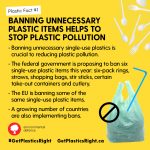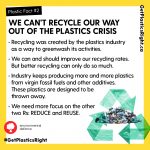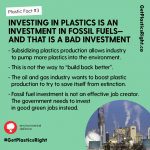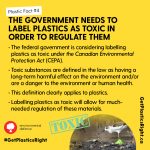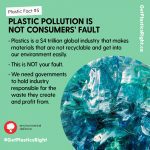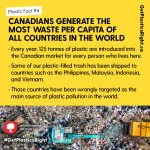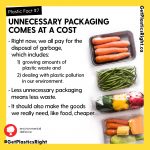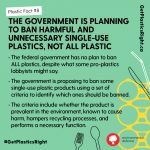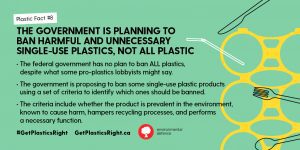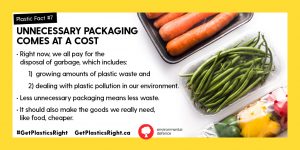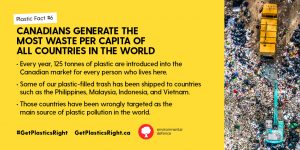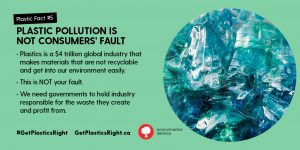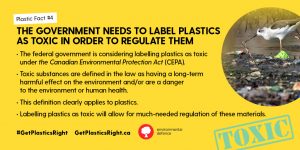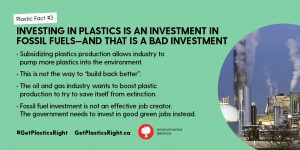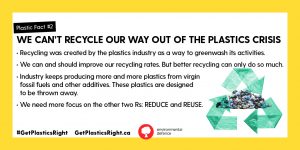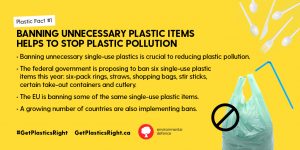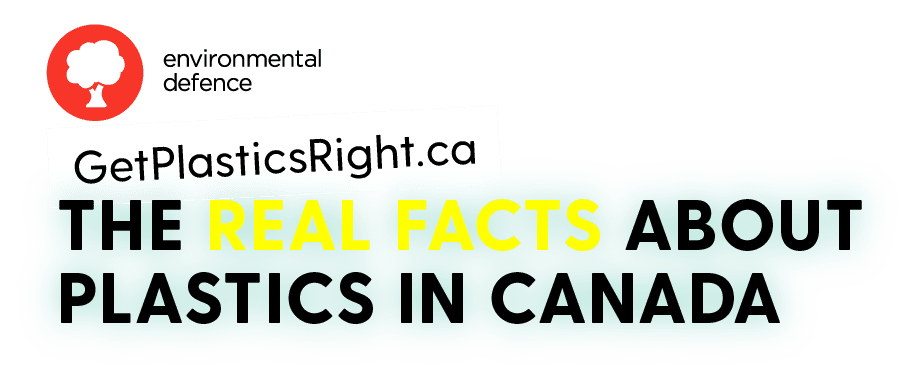

Canada is taking action to reduce plastic waste. The federal government plans to ban six single-use plastic products and list plastic as a toxic substance under the Canadian Environmental Protection Act. Companies that profit from pumping plastics into our economy -and the environment-are spreading disinformation to try to prevent any new rules. Here’s the information you need to push back!




FACT 1: Banning unnecessary plastic items helps to stop plastic pollution
There is no better way to stop birds and other animals from getting strangled by unnecessary packaging than to ban plastic six-pack rings and other plastics that animals get ensnared in. Banning the checkout bags that are filling the world’s oceans and deserts is a crucial step in preventing whales or camels from starving to death with bellies full of plastic.




FACT 2: We can’t recycle our way out of the plastics crisis
Recycling has been around for more than four decades. During that time, the amount of plastics polluting our environment has grown substantially.
Recycling was originally created by the plastics industry as a way to greenwash its activities. Back in 1974, an industry insider admitted that recycling was never going to be economically viable – and that continues to be true today.




FACT 3: Investing in plastics is investing in fossil fuels-and that is a bad investment
The plastics industry is looking for handouts as part of Canada’s recovery from COVID-19. But subsidizing plastics production so they can pump more plastics into the environment is not the way to “build back better.”




FACT 4: The government needs to label plastics as toxic in order to regulate them
The plastics industry is fear-mongering over the government’s plan to label plastics as toxic under the Canadian Environmental Protection Act (CEPA), claiming that the “toxic” label will cause problems. But the federal government’s own scientific assessment confirms that plastic harms the environment and there is growing evidence that it affects human health too.




FACT 5: Plastic pollution is NOT consumers’ fault
Yes, people should recycle and not litter. However, individual people handling their waste properly is not going to solve the world’s plastic problem or even Canada’s.



FACT 6: Canadians generate the most waste per capita of all countries in the world
Here’s the truth: Canadians generate the most waste per capita of all countries. Every year, 125 kgs of plastic are introduced into the Canadian market for every person who lives here. That’s a massive pile that is mostly used just once and then thrown away.




FACT 7: Unnecessary packaging comes at a cost
What retailers are really saying is that if there are any costs associated with the new plastics restrictions, they will pass them on to us at the checkout counter. What they’re not saying is that we already pay the costs associated with their packaging.


FACT 8: The federal government isn’t planning to ban ALL plastics, only some single-use plastics
This one’s a doozy – but some folks out there are fear-mongering, claiming that banning plastic straws and the likes will lead to a ban on hockey equipment and IV bags. It’s absurd. The federal government has no plan to ban ALL plastics, despite what some pro-plastics lobbyists might say.



Take Action
Write to Prime Minister Justin Trudeau and Environment Minister Jonathan Wilkinson and urge them to get moving to rein in our ever-growing plastics problem.




Spread the Word
Download and share on social media these graphics with the real facts about plastic pollution in Canada.




The Plastic Wall of Shame




JOIN THE COMMUNITY
Join more than 250,000 Canadians who are working together to ensure a climate safe, toxic-free, healthy environment.. Whether you sign an online petition, attend an event or workshop, register for email updates, or write a letter to a decision-maker, you make change happen.

